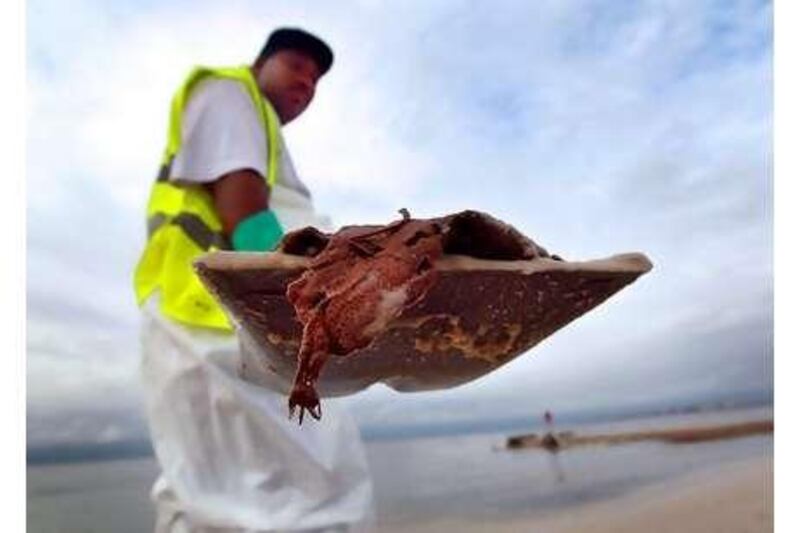Shares in BP leapt more than 5 per cent in early London trading on news that Middle East investors were interested in acquiring strategic stakes in the troubled oil giant, and one informed source indicated an Abu Dhabi company was among potential investors. The shares settled back later to close at 333.3 pence, 3.51 per cent ahead.
But it was one of the few positive days for BP shares since the blow-out on a Gulf of Mexico rig in April sparked an environmental and corporate crisis. The shares have lost half their value since then. Reports said sovereign wealth funds in the UAE, Kuwait, Qatar and Libya were interested in buying BP shares. The National reported on Sunday that BP was looking for regional financial institutions to take a big stake - as much as 10 per cent - to help stabilise its financial position, which has been hit by the multibillion-dollar cost of the clean-up and legal claims from the accident.
BP said in London: "We welcome new shareholders and existing shareholders increasing their holding, but there are no current plans to issue new equity." The company has undertaken a review of corporate strategy after the rig disaster. One source familiar with that review said the idea of attracting new investors, especially from Middle East sovereign wealth funds and other big corporations, was part of that strategy.
He declined to comment on potential investors, but it is believed an Abu Dhabi institution is in contact with BP with a view to buying shares or backing the company through convertible debt issues. BP believes the shares have hit a bottom and will rise sharply once the well is "capped" and the leak of crude halted next month. "There is an end in sight to the oil flowing into the Gulf," said the source. "We then move to a clean-up operation and begin to deal with the claims."
Analysts have put the total bill for the Gulf of Mexico disaster as high as US$60 billion (Dh220.38bn). So far, costs associated with the spill have risen above $3bn, the company said in a release yesterday. BP's financial position is still strong but the cost of insuring its debt against default has risen, prompting some analysts to suggest a capital-raising exercise would help to calm market fears and reverse the share price decline.
"Some debt holders would like to see some extra equity on the balance sheet," said Rob McKinnon, the chief investment officer of the Saudi-owned ASAS Capital. Rachel Ziemba, the sovereign wealth analyst at the Roubini Global Economics think tank, said: "I could imagine there would be a lot of investors in the region interested in picking up a global oil major at what they see as an undervalued price."
The Kuwait Investment Authority, which holds 1.8 per cent of BP, declined to comment, as did the Qatar sovereign wealth fund. Shokri Ghanem, the chairman of the Libyan Investment Authority (LIA), told Dow Jones: "BP is interesting now with the price lower by half and I still have trust in BP. I will recommend it to the LIA." The BP review also includes the possible sale of about $10bn of assets and a reassessment of the role played by senior executives after the Gulf of Mexico accident.
Carl-Henric Svanberg, the chairman, and Tony Hayward, the chief executive, have been under pressure from shareholders, with some calling for a "clear-out" of executives. BP's Middle East production and exploration business is based in Abu Dhabi, where it is in partnership with the Abu Dhabi National Oil Company. Its Middle East refining and marketing base is in Dubai. @Email:fkane@thenational.ae





